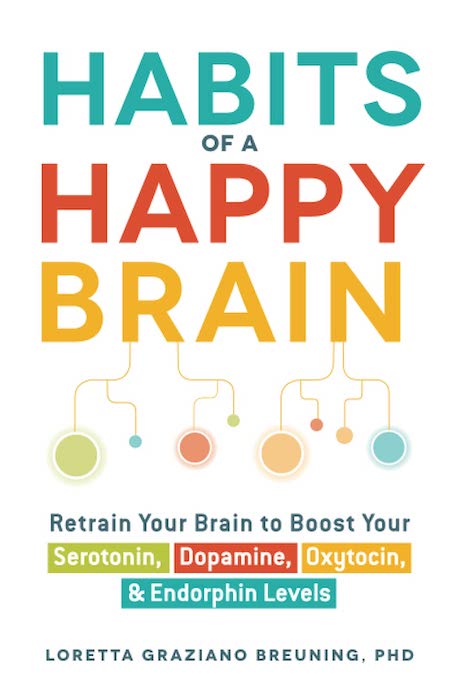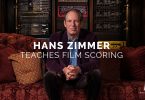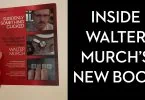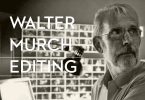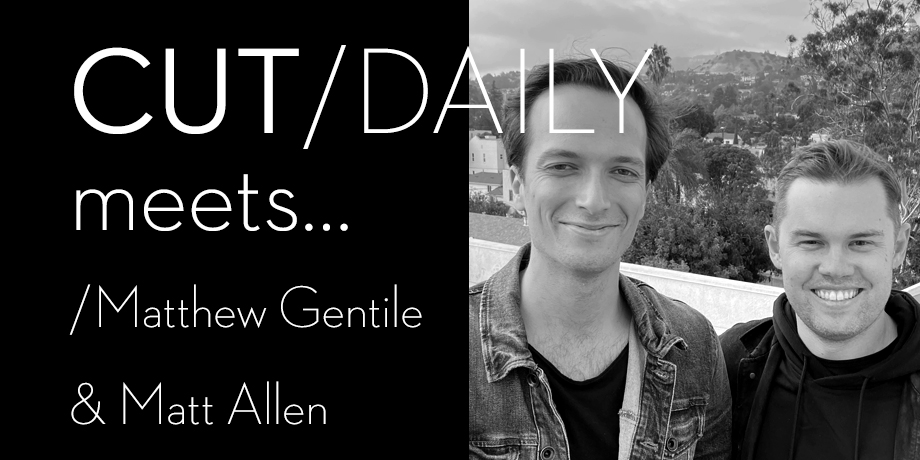
American Murderer is an indie feature film from first time director Matthew Gentile and first-time editor Matt Allen.
Matt Allen and Christopher Young split the editing work between them whilst also taking on a few extra roles as well – this is an indie feature after all. Both had previous experience assisting on other feature films, TV shows as well as numerous short films.
Based on the true story of Jason Derek Brown, a con man who became one of the FBI’s top-ten most wanted fugitives. It also has an impressive cast including Ryan Phillippe, Idina Menzel, Paul Schneider and Tom Pelphrey. You can stream the movie now on Amazon Global Stores.
In this ‘guest issue’ of Cut/daily Meets… an on-going series of interviews over on my free weekly Post Production newsletter Cut/daily, you can learn a lot about what it takes to pull of a movie like this, from both director Matthew Gentile and editor Matt Allen.
You can follow director Matthew Gentile on Instagram and editor Matt Allen on Instagram too.
My biggest take away?
How important the creative use of pre-vis and stock footage was in shaping the trajectory of the final edit and developing a common understanding of the style, tone and approach of the film:
The way the script was written in the first two thirds of the film were nonlinear, but the third act was completely linear. It worked well on the page, but after shooting and getting into editing, we realized were having an issue around our climax — after all that build up, it fell kind of flat.
Matt devised what we referred to as the “third act scramble”. He blew my mind when he went out on his own and created a whole chase sequence in the third act out of stock footage from other movies.
That inspired me to go out and shoot this chase during our second unit photography.
Director, Matthew Gentile
Even More Interviews with Seasoned Post Production Professionals
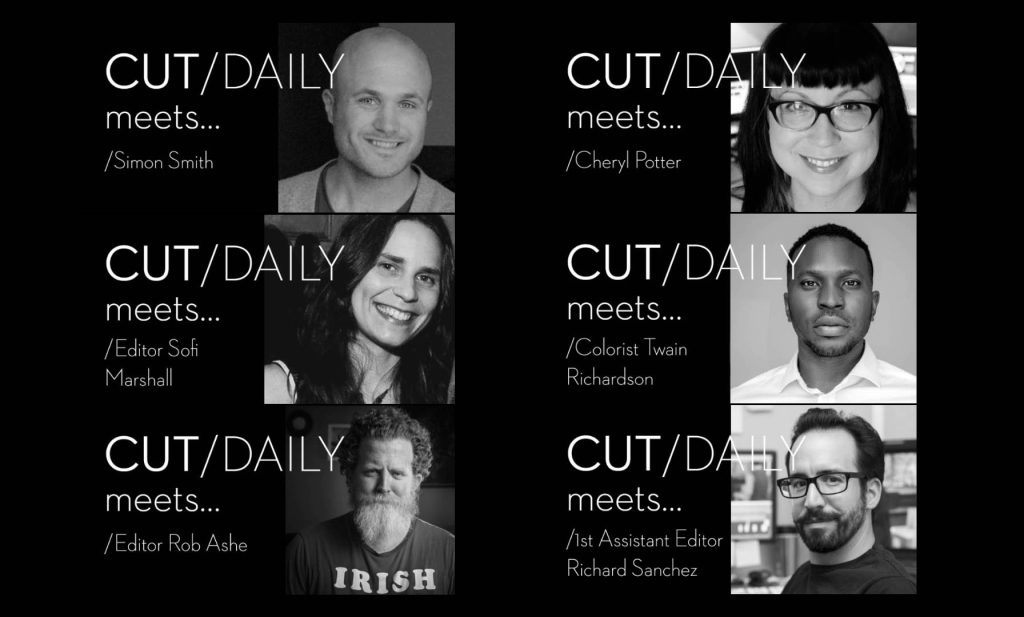
If you want to learn from 30+ other Post Production professionals in a similar interview format check out the archive of Cut/daily Meets… interviews here, which includes Post pros who have worked on:
The Handmaid’s Tale, John Wick, Chernobyl, Conan, The Suicide Squad, Once Upon a Time in Hollywood, Bullet Train, The Power of The Dog, The Late Late Show, Ghostbusters: Afterlife, Curb Your Enthusiasm, Veep, The Harder They Fall, The Martian, Solo: A Star Wars Story – to name just a few!
American Murderer – Director and Editor in Conversation
What’s your daily work routine?
Director Matthew Gentile: I love to start my day early! I like to rise at 6am get morning pages in so I can have what I call ‘free writing’ before my phone and emails blow up. I try to write every day, and I’m pretty good about that.
For the rest of the day, it really depends on what stage of the filmmaking process I’m in. Sometimes days are filled with writing, drawing storyboards and shot-listing in my office until the evening when I am in the writing/pre-production phase of one of my films. In the days of promoting a movie, a lot of press/interviews.
In the late afternoon, I try to take a swim or a run to break the day up and give me a pick me up before a strong finish. Shooting or hard prep is an all-day endeavour and I’m just to try to streamline every other part of my life so all my decision-making energy can be put toward the shoot.
As a director, especially on set, you’re making hundreds of decisions everyday while shooting. When it comes to editing, I was fortunate to have Matt who is really self-sufficient and pushes the post production process along. That being said, I love the editing process and sitting in the editing room so often we would spend the day working together, or sometimes I would give Matt an idea to try.
I want to say that Matt is really good at taking feedback from myself and the producers. He and I are both not precious. I didn’t find so much that I was ‘giving him notes’, because I felt very much that Matt and I were on the same side and in it together. Co-authors, collaborators working together to tell the same story.
The mission was: improve the picture. Period. We both want to craft the movie for the audience experience. And that was true of so many people on this film that gave so much time and energy to bring this thing to life.
Editor Matt Allen: I try to keep it simple. While editing American Murderer, I was usually at my desk editing with my morning tea in hand by 8:30am. I try to schedule any meetings with producers or other collaborators we’re going to have at the beginning of the day or shortly after my lunch break is over.
Lunch on movies is 1pm. I’m honestly really trying to set aside large chunks of time of deep focused work throughout the day. That might be 9am to 1pm or 2pm to 6pm, or some combo, I’m trying to get into state of flow as artist whether it’s editing a scene by myself or working with a director in the room.
I really enjoyed that Matthew and I would often take walks and get outside the cutting room on our lunch breaks. We sometimes use this as a brainstorm session for the movie or to give ourselves a break.
I also try to end my day at a reasonable time but it just depends on the day. Sometimes I have achieved a state of flow and it makes sense to keep going because I’m getting a lot done and sometimes (especially when the schedule allows) I need to stop early because I’m not being productive anymore. It’s a fine line, but sometimes you can overwork a scene or just start making it worse and you need to come back tomorrow with fresh eyes.
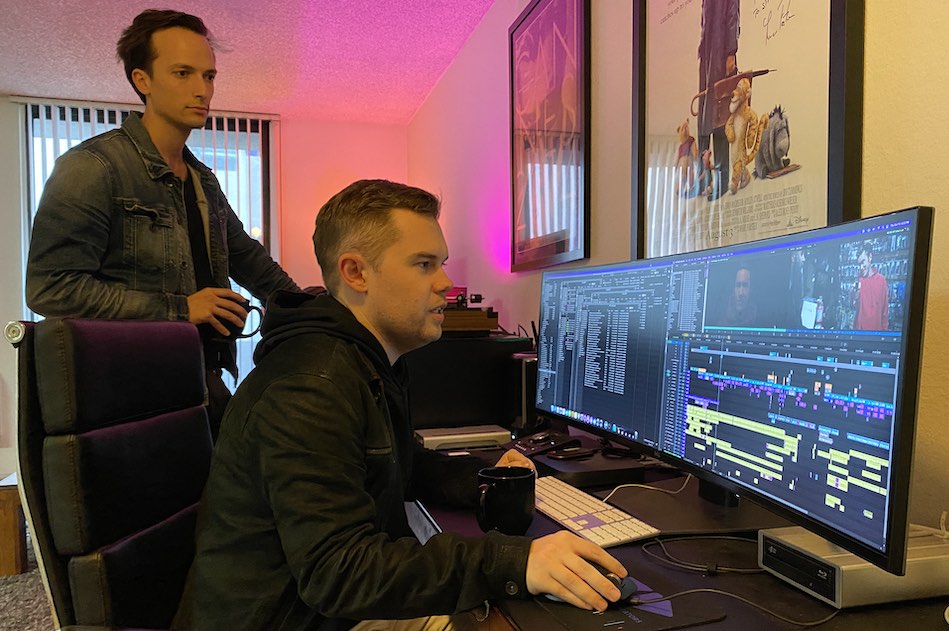
What do you now know about your work that you wish you’d known when you first started?
Editor Matt Allen: I wish I had known the importance of good cold outreach and the importance of building your network. How good your network is determines the quality of jobs and mentors you’re going to have. This is an area I’m constantly trying to get better at and harnessing this skill, I believe, is game changing
Director Matthew Gentile: There are many things I had wish I had known when I started. When I first set out to write and make American Murderer, I had no idea how long it would take and how much of a marathon it would be to get to the finish line. In a way, I’m glad I didn’t know because that way the journey unfolds. But I think filmmakers of all kinds have to prepare to be in it for the long haul — it’s a life and it’s truly all consuming.
What did your biggest professional failure teach you?
Director Matthew Gentile: I think failure is essential to the process, and I’ve learned to embrace it as par for the course. I think the trick of it all is to learn to not be afraid to fail, but to allow myself to see this as being about process and not product.
Results are a difficult thing in our field, especially because film as an art is so subjective. So I think you make the best film / write the best script you can. Get some space, see how people respond to it. Assess its strengths and shortcomings on your own, and always try to do better on the next one.
A great teacher of mine named Peter Markham at the AFI once said to me after I made a pretty bad short film, said: “stop striving for perfection, just keep trying to be better.”
Editor Matt Allen: I think we’re always learning and failure is part of learning and getting better as a filmmaker even though it will be really uncomfortable. I don’t think you’re pushing yourself enough if you’re aren’t experiencing any failure at all at some point in your journey.
Failure has taught me to seek out great mentors and to be persistent. Also, as editor, you have to create a safe space for failure in the editing room for your fellow creatives and the director. Someone might have a creative idea that is awesome or it completely doesn’t work, but you have to be open and willing to try it. It could lead to complete failure or working better than you could ever imagine.
Matthew would often say to me during this film – “Be prepared but be flexible”.
What’s the #1 thing that has helped you shorten your craft’s learning curve?
Director Matthew Gentile: I don’t know if there are really any shortcuts in film, but I would say consistency for me is key. Writing every day works, because no matter what — even if I’m not writing the best screenplay, I’m still writing a screenplay.
There’s a great interview with Ira Glass, where he talks about how the only way to close the gap between where you currently are as an artist/storyteller and where you want to be/what your taste is to just do a large volume of work. I agree with that.
Editor Matt Allen: Great mentors have absolutely shortened my craft’s learning curve. It’s been essential for me to form relationships with highly experienced veteran editors who have been extremely generous with their time to pass down knowledge of their editing craft.
I have been truly humbled by the editors who have given me advice and mentorship that saved years of going down the wrong path or making uneducated career choices that would have delayed my professional growth.
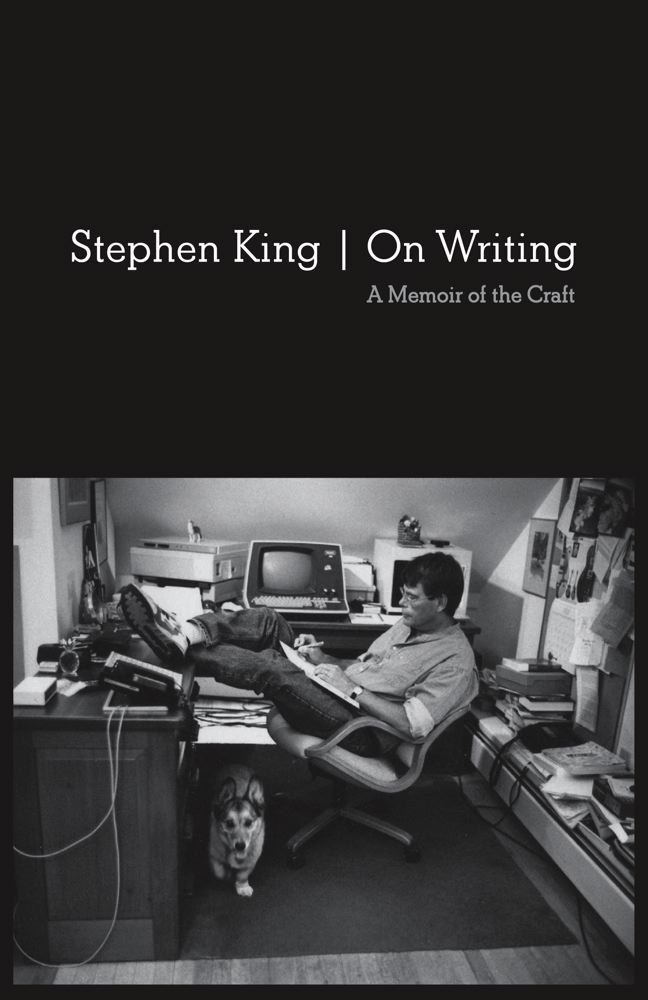
What book has helped you the most over your career?
Director Matthew Gentile: I am a pretty voracious reader, so this is a tough one for me but I’ll go with three:
- Elia Kazan’s Kazan On Directing is pretty spectacular.
- Sidney Lumet’s Making Movies is also a great go-to.
- And Stephen King’s On Writing.
Those are my three craft books that I found particularly useful.
Editor Matt Allen: I will highly recommend a book called Selected Takes: Film Editors on Editing. It’s a wonderful read from some really great editors.
I would also recommend the book Habits of a Happy Brain, but read it with the mindset of filmmaking. You realize that you’re reading a book about brain chemistry that is very linked to storytelling and the emotional rollercoaster ride we’re trying to take an audience on through a film.
How did the editors (Matt Allen and Christopher Young) divide the work on the film, and what was that like?
Director Matthew Gentile: Filmmaking is a team sport and that’s what we had on this
film American Murderer – a great team. Both Chris and Matt came onto the film quite early, and aside from co-editing, made serious contributions before we ever shot a frame.
In the development phase, Chris worked closely with me as my script editor. He read every draft of my script, gave me notes, read scenes out loud with me, batted around ideas. He was instrumental, and made the writing process feel way less lonely because he also believed so much in the film.
Matt joined American Murderer early – in pre-production, by creating and editing the pre-visualization for the set pieces in the film. Matt also worked as the pre-visualization editor (and eventually score producer and post production supervisor as well).
At the end of the day, Chris, Matt and I were all working together to serve the film and make the best movie possible.
Editor Matt Allen: Yes, I totally agree with Matthew. Filmmaking is a team sport and we had so many people on the post production side who really stepped up to make this film happen including Matthew’s brother – Scott Gentile who is an amazing classical pianist and conductor who wrote his first film score on American Murderer.
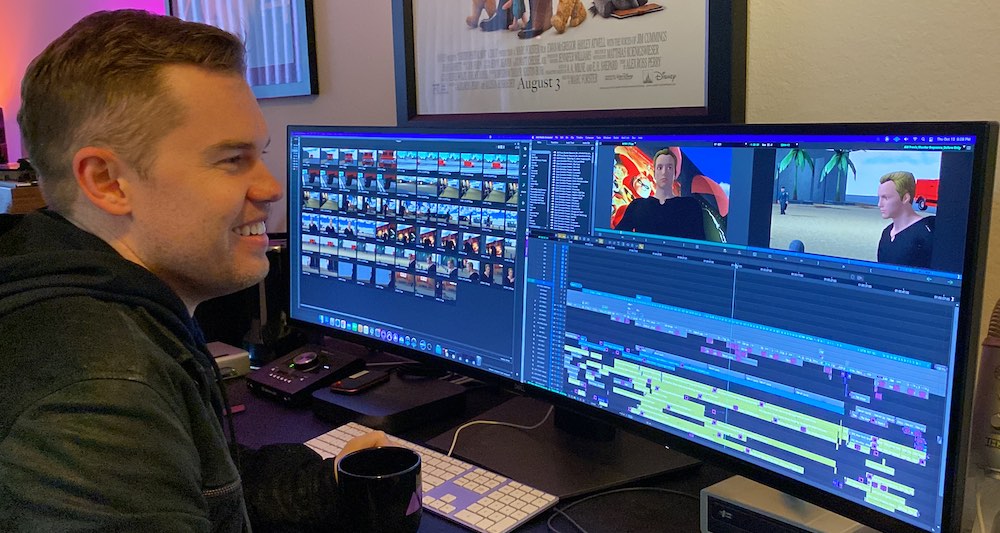
What were some of the story/technical/workflow challenges you faced in the editing process and what creative solutions did you find?
Editor Matt Allen: American Murderer is a true crime thriller so we wanted to craft a “ride” for the audience to go on for about 100 minutes that grabbed and kept the audience’s attention. Matthew and I had quite a few conversations about tone because we knew it was going to be challenging.
The tone needed to subtly, but confidently shift throughout the film. We were going to start in a place where people were going to be intrigued by Jason and maybe even like him to a situation where the whole world is collapsing around him due to his decisions.
A big challenge was the nonlinear structure and how much we could scramble up the timeline without confusing the audience. Some virtual audience previews and screening it for some trusted and veteran directors and editors really helped us discover the right blend of mixing up the timeline.
Director Matthew Gentile: Matt did an excellent job with helping me craft the nonlinear structure in the film and making it even better. He’s definitely a director’s best friend. I really needed his help in the third act of the film.
The way the script was written in the first two thirds of the film were nonlinear, but the third act was completely linear. It worked well on the page, but after shooting and getting into editing, we realised were having an issue around our climax — after all that build up, it fell kind of flat.
Matt devised what we referred to as the “third act scramble”. He blew my mind when he went out on his own and created a whole chase sequence in the third act out of stock footage from other movies. That inspired me to go out and shoot this chase during our second unit photography.
Also, Matt mentioned, getting the right tone for the film was really important to me and as we know, music plays a huge role in setting tone. Personally, I find the concept of temp music to be a little silly and challenging — but when Matt temps music, he is very careful and deliberate with what he chooses.
This really helped my brother when he became involved, and things went to whole new level when they started working together.
Matt was definitely a co-author of the film.
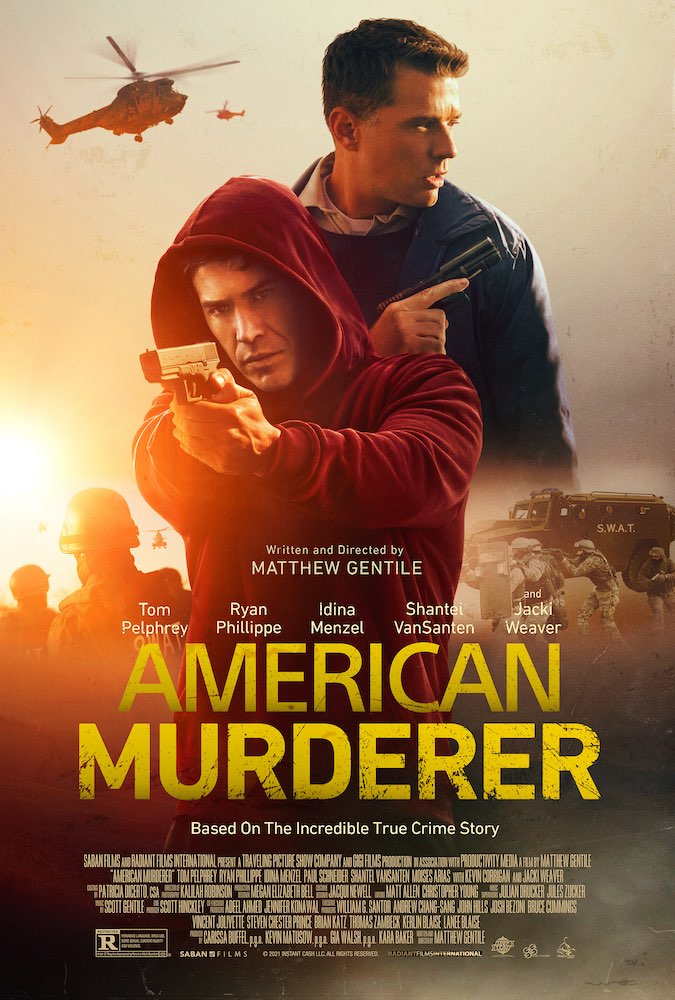
As this was both your first feature film as director & editor, what was the most surprising part of the experience?
Director Matthew Gentile: One of things I was most surprised by was how helpful previs was to my process and how Matt Allen brought this skill set to the table.
Matt got involved in pre-production during the summer of 2020 and played a unique role. At the time, Matt Allen had received the prestigious Eric Zumbrunnen Fellowship from the American Cinema Editors and was working under Oscar Nominated editor Matt Chesse as an assistant editor.
I had met Matt at film school at AFI and he impressed me the first time we met. I kept an eye on his career because I knew he was going places. During the pandemic, Matt had taught himself this previsualization program called ShotPro and offered to help previsualize some scenes from American Murderer with me.
Not knowing much about the process, I was skeptical at first if this was going to be helpful to my pre-production process and I didn’t think I could hire Matt to edit the film (since I was a first time director and normally producers encourage you to work with department heads that are more experienced).
Matt didn’t care and with his positive attitude, we jumped right into previz. And I realised very quickly that Matt and I worked really well together and that he had to cut this movie.
Seeing all the hard work Matt had done before a single frame was shot and his resume as an assistant editor, it was a pretty easy sell to the producers.
I credit Matt with getting me directing again before the shoot happened in Utah.
Editor Matt Allen: Like Matthew I was surprised by how importance our time previz-ing the film was. I do credit previz-ing scenes in preproduction with Matthew as a really important time to get on the same page creatively with him.
As an editor, I think we can sometimes be at a disadvantage in pre-production compared to the some other department heads. Creating Previz and editing previz with the director allows me to start that collaboration well with a director without actors showing up yet and footage is starting to appear in my editing system.
Once that happens, the clock has started at the point and you can feel the pressure to get something done in a timely manner because everyday of production is expensive. Having that time with him allowed me to know what he looking for in the edit, I will credit that with a better 1st cut of the film.
Obviously, you still have a great deal of moulding and shaping to do with the director to get to a finished film, but starting in a great place makes your director feel secure and willing to try things and explore the final rewrite of the film.
How did the process of working on the short film inform the feature length version?
Director Matthew Gentile: Honestly, they were two separate things but I made the short because I knew I needed a calling card for the feature. And if I’m being honest. It’s a big commitment for someone to sit down a read an 110 page screenplay, but most are game to watch a 5 minute short. So the short was designed to get people excited about the project and give them a sample of how I might the direct the film.
How did you secure such an amazing cast for your first feature as writer/director? (Congrats!)
Director Matthew Gentile: I was fortunate to have great producers in Kevin Matusow, Carissa Buffel and Gia Walsh who believed in me and pulled off this production in the midst of a global pandemic.
I am very grateful to them that they came along side me and championed my dream to make this film. You need great producers and a compelling script and a great team around you to secure such a great cast.
Also a big shout out to the amazing cast including Tom, Ryan, Idina, Jackie, and Shantel who believed the vision of a first time director. I believe they all did amazing work!
And your parting piece of advice?
Director Matthew Gentile: Casting as a director is 90% of your job. That doesn’t just apply to the cast, but also in your crew and your key collaborators. That’s why you hire people like Matt Allen.
This guy has an amazing work ethic and is an incredible artist. And all his talent and hard work makes me look good as a director. I know he would do a fantastic job for any director that hired him to cut a film.
He’s definitely someone I would keep your eye on.
Editor Matt Allen: While making this movie, I learned the importance of having a great team around you. This was a very ambitious debut feature film and we were fortunate to have so many wonderful collaborators in so many departments. Thank you to everyone who helped make this happen!
I will say that I really tried to daily practice a piece of advice that my mentor Oscar-Nominated editor Matt Chesse once told me – “Kindness is not a line item in the budget, it is given freely.”
Thanks so much guys for sharing your insight and experience!
Take This Further
You can listen to both Matthew Gentile and Matt Allen on the Avid Rough Cut podcast here.
Enjoyed reading this interview? Check out all the other Cut/daily Meets… interviews here!

